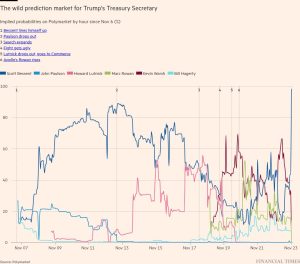The power and the perils of Trump’s ‘flow state’
Unlock the US Election Countdown newsletter for free
The stories that matter on money and politics in the race for the White House
For 30 minutes straight, Donald Trump stood on stage as a typically incongruent selection of his favourite songs — from his beloved “YMCA” by the Village People, to “Nothing Compares 2 U” by Sinéad O’Connor, to Rufus Wainwright’s version of “Hallelujah” — blared out from the speakers. Sometimes he stood gazing at the crowd; sometimes he waved and pointed; sometimes he broke into his signature swinging-hips-and-clenched-fists dance.
Adore him or abhor him — and it does tend to be one or the other — there could be no doubt that the second half of Trump’s town hall in Pennsylvania on Monday was a surreal and quite unprecedented spectacle, even by the outlandish standards of 21st-century American politics.
For Democratic nominee Kamala Harris’s campaign, it was also a chance to add fuel to the fire of growing speculation that her Republican rival is losing his marbles. “Trump appears lost, confused, and frozen on stage as multiple songs play for 30+ minutes and the crowd pours out of the venue early,” her campaign’s account posted on X. “Hope he’s okay,” Harris posted from her own account, quoting the “Kamala HQ” post.
Much of the press followed suit, with an MSNBC headline reading: “Trump’s bizarre music session at town hall reignites questions about mental acuity”, and a Newsweek column arguing that “Dancing Donald Trump is clearly in a steep decline”. “For those of us who’ve had family members slip into dementia, it was a familiar sight,” the column read.
As someone who lost their father to dementia several years ago, I must say I did not find Trump’s spontaneous DJ set a very familiar sight. The truth is that Trump was utterly in the zone. He was displaying how comfortable, relaxed and confident he was feeling. This was, after all, a town hall that felt more like a rally for the Republican candidate — most of the crowd appeared to be dressed in Maga gear; Trump referred to them as “patriots”. He wasn’t being senile. He was in his “flow state”.
Coined by the late psychologist Mihaly Csikszentmihalyi, this is “a state in which people are so involved in an activity that nothing else seems to matter”. In this state, a person is so engaged and absorbed in what they are doing that there is no place for self-doubt or second-guessing. Neuroscientists have found evidence that, in a state of flow, activity reduces in the prefrontal cortex of the brain — where “self-referential activity” takes place — while our alpha brain waves, which occur when we are in a meditative and relaxed state, are increased. Inhibition is turned down, while creativity is dialled up. Trump enters this state often.
If you have the patience, it is worth watching the town hall in its entirety, or at least skipping through it — you’ll get a rather different impression from many of the news reports by doing so. You’ll find, for instance, that the crowd had already spontaneously broken out into “God Bless America” while proceedings were paused because people had fallen ill, and long before Trump started playing music himself.
You’ll also see that Trump had intended “YMCA” — the first song of his 30-minute run — to be his walkout song but decided to play more music when he noticed that the crowd was not leaving. “Nobody’s leaving, what’s going on? Keep going? Should we keep going?” Trump asked the crowd, to loud cheers of approval. “Alright, turn that music up. Turn it up!”
Let’s be clear: while it might be fair to acknowledge that Trump displays impressive stamina for a 78-year-old McDonald’s aficionado, he does also seem to be making increasing numbers of verbal slips, and that those may be age-related. At the same town hall he encouraged voters to go and vote “on January 5th” (two months after the election date). He recently said “the president of North Korea” was “basically trying to kill” him (he is presumed to have been talking about Iran). There are many other examples.
Trump could well be suffering from some form of cognitive problem — I am no expert. But the idea that his impromptu musical interlude demonstrated that he is suffering from dementia is either disingenuous or wishful thinking. Sure, it was bizarre, but Trump is a bizarre politician, and that is a huge part of his appeal.
It is worth saying that Trump’s uninhibited, improvisational style does not always work in his favour. He often rambles — though he calls this “weaving”. But the idea that he is losing the plot doesn’t seem to be persuading undecided voters. The age of slick West Wing-esque politics is over; vibes-based politics has taken its place. A better tactic for Democrats trying to beat Trump, therefore, might be working out how they can spend more time in their own, less polished, flow states.
#power #perils #Trumps #flow #state




